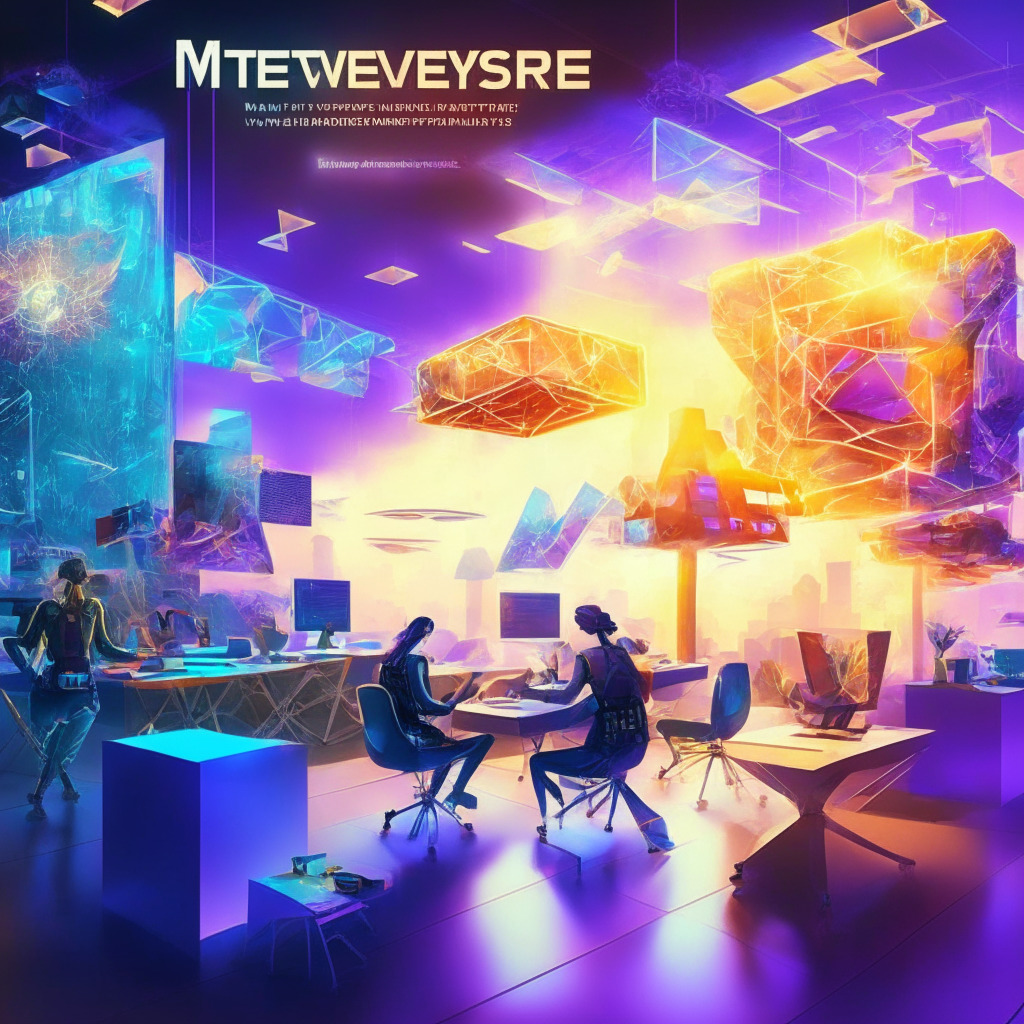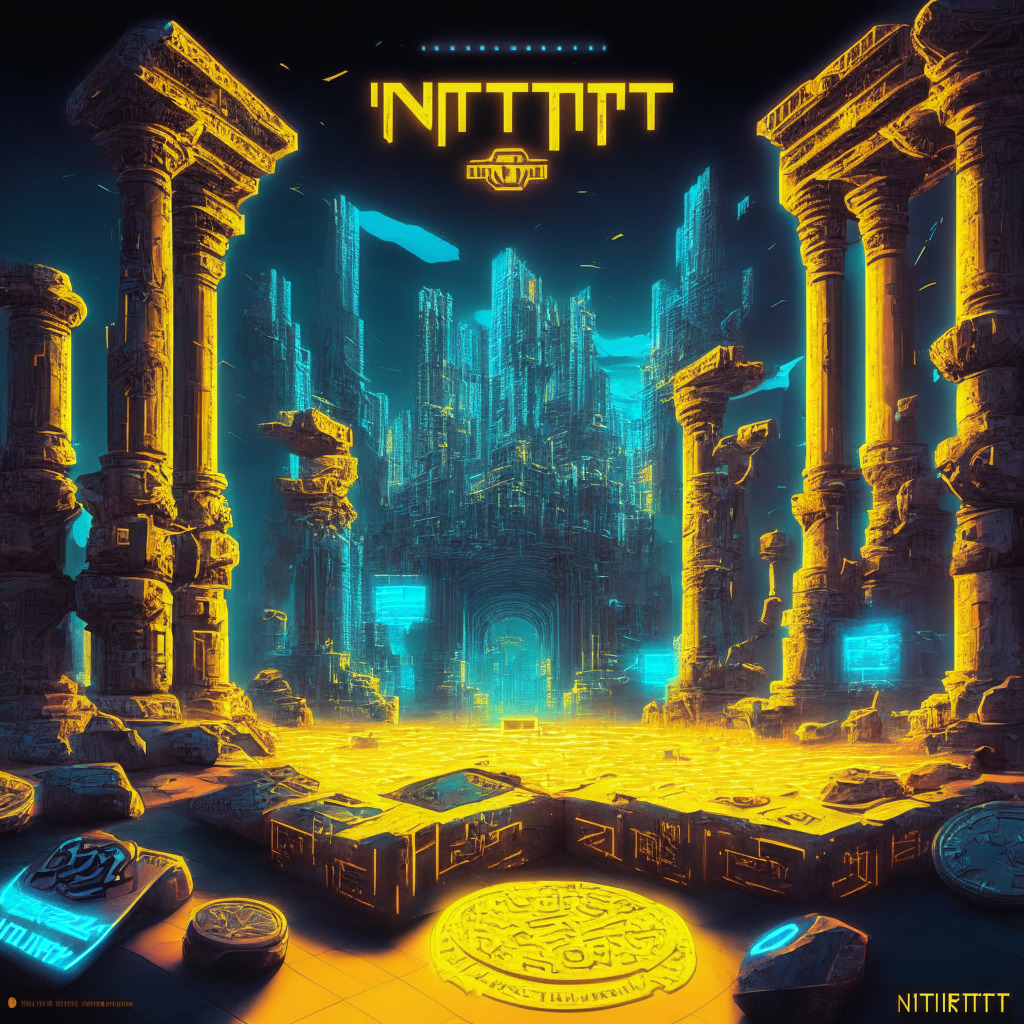Ark Invest recently sold 478,356 Coinbase shares, amounting to a $53 million liquidation. The funds are being routed towards Meta Platforms and Robinhood. However, Coinbase’s stock prices surprisingly rallied after a US court favored Ripple in a lawsuit, causing a nearly 70% surge in XRP price.
Search Results for: meta platforms
Breaking Down The AI Training Ethical Dilemma: Copyright Claims Against Meta Platforms and OpenAI
Authors Sarah Silverman, Richard Kadrey, and Christopher Golden accuse Meta Platforms and OpenAI of copyright infringement, claiming that their copyrighted content was used without permission for AI training. The lawsuit highlights the ethical boundaries around incorporating copyrighted material into AI technology development and could have significant implications for the blockchain and AI industry.
Understanding the Real Metaverse: Beyond Meta’s Bubble and Towards Community-Driven Platforms
“Yuga Labs’ CEO Daniel Alegre critiques Meta’s interpretation of the ‘metaverse,’ which he believes fell short of user expectations. He highlights platforms like World of Warcraft and Fortnite that successfully built engaging metaverses, compared to Meta’s unremarkable Horizon Worlds. Alegre explains the importance of user community input in shaping successful metaverse projects and the divergent, evolving roles of nonfungible tokens (NFTs).”
Disrupting Freelancing: DeeLance’s Blockchain Metaverse vs Traditional Platforms
DeeLance, a decentralized web3 freelancing and remote work platform, disrupts the recruitment sector by offering a blockchain-centered, secure environment. Addressing issues like exorbitant fees and payment fraud via tokenized NFTs, it has raised over $1.2 million in its $DLANCE crypto token presale. However, challenges like compatibility with existing systems and cryptocurrency volatility remain.
DeeLance: Challenging Centralized Freelance Platforms with Crypto-Powered Metaverse
DeeLance, a Web3 freelance metaverse platform, raised $1.2 million through its $DLANCE token sale, aiming to challenge Fiverr and Upwork with its decentralized, NFT-powered platform. DeeLance intends to solve copyright infringement, payment fraud, and other issues by leveraging blockchain technology, offering secure and transparent freelance work opportunities for all users.
Balancing Act: MetaMask Snaps’ Transaction Transparency vs User Overwhelm
“MetaMask, a wallet provider, recently introduced a feature, Snaps, aiming to offer users greater insights into their transactions and interactions. They include Wallet Guard, providing detailed information before transaction authorization. However, concerns arise over the increased complexity and user involvement required.”
Meta AI vs OpenAI’s ChatGPT: The Dawn of a New Social Media Interaction Era and Its Ramifications
“Mark Zuckerberg sets to launch Meta AI, interacting across platforms like Instagram and Facebook. Aiming to outdo OpenAI’s ChatGPT, Meta tailors AI products to distinct use cases and entertainment, scheduled to release to selected U.S users and integrate with upcoming smart glasses.”
Shifting Development Tools: ConsenSys Discontinues Truffle and Ganache for MetaMask Snaps and SDK
“ConsenSys, a leader in Ethereum software, has decided to discontinue key toolkits, Truffle and Ganache. The firm plans to focus on empowering developers through MetaMask toolkits. The transition involves an alliance with HardHat, support platforms for developers and the launch of innovative decentralized applications, MetaMask Snaps.”
Walmart’s Metaverse Endeavor: Tactical Move or Ethical Dilemma?
“Walmart has announced its foray into the metaverse platform Roblox, aiming to attract a large user base. Despite the opportunity, concerns rise over ethical advertising, as 25% of Roblox’s users are children below 13. The fine line between providing engaging content and exploiting vulnerable audiences underscores the need for discussion on ethical use and lawful deployment of these technologies.”
Deciphering the Paradox: The Ambitious Race to Democratize the Metaverse
Meta’s latest product, Horizon Worlds, aims to bring metaverses to mobile and web platforms. Amid limited accessibility and undisclosed user statistics, the promise of a democratized metaverse that caters to every individual remains uncertain. However, blockchain-based platforms like Decentraland and The Sandbox have chosen to start with PC and web-based experiences, offering a contrast to Meta’s approach.
MetaMask’s Bold Moves: Expanding Crypto Conversion Amid Scam Woes
MetaMask has enhanced its user experience by allowing ETH conversion to fiat currency. Despite advancements, it faces scamming challenges with fraudsters creating bogus MetaMask sites for illegal activities. Users need to be vigilant and proactive in reporting any suspicious activity or compromised security details to MetaMask.
Unraveling the Tax Conundrum in the Metaverse: A Closer Look at Virtual Economies and Policies
Harvard legal scholar, Christine Kim, proposes a shift in tax principles for the ‘metaverse’. Economic activities involving virtual assets could be considered taxable. She outlines models for tax collection, accounting for potential resistance and discusses possibilities for taxing unrealized gains. Managing tax evasion and accurately valuing new assets are identified as challenges.
Decoding Future Taxes: Is the Metaverse A New Tax Haven or a Revolutionary Taxation System?
“Harvard legal scholar, Christine Kim argues the metaverse should be taxed immediately, as significant wealth is generated by users through real economic activities. Kim proposes immediate taxation and two enforcement methods: platforms withholding taxes or a ‘residence taxation’ module for users.”
Mainstreaming Crypto: The Future of Digital Transactions Unfolds on Social Media Platforms
“Social media giant, X, has established cryptocurrency payments for its global audience, following recent approval from regulatory authorities. This brings good tidings for X’s network of 400 million users who can potentially interactively share via cryptocurrencies, transforming the social media platform into an ‘everything app’.”
Managing Events in the Metaverse: Navigating Complexity and Optimizing Potential
“The fusion of virtual reality with physical reality gives birth to the metaverse: a communal virtual space hosting augmented reality (AR), virtual reality (VR), and more. Events in the metaverse promise interactions that transcend boundaries and offer an immersive digital experience, yet pose unique complexities and risks.”
Unraveling Meta’s Code Llama: The Next Frontier in Crypto or a Threat to Decentralization?
“Meta’s new tool, ‘Code Llama’, offers a community-licensed AI meant for generating and discussing computer coding. This platform could prove critical for businesses and individuals, including bot developers and crypto exchanges. However, it also prompts questions around neutrality and US SEC scrutiny, especially as it signifies a move towards blockchain and crypto project decentralization.”
The Metamorphosis of Music: Blackpink’s Takeover of the Metaverse With a Virtual Concert Experience
K-pop sensation Blackpink has joined forces with Roblox and metaverse studio Karta to create ‘Blackpink: The Palace’, an online event providing fans with immersive, music-centric experiences. The Palace offers fans opportunities to interact with digital avatars, mine crystals, participate in Blackpink-themed parties, and purchase custom outfits. This novel integration of music and virtual realms signifies the expanding influence of metaverse platforms within the music industry.
Exploring Lamina1: Creating an Accessible Blockchain Based Metaverse with Carbon Neutrality
“Lamina1, a blockchain dedicated to the metaverse, has revealed its betanet platform for developers and creators. Supported by sci-fi author Neal Stephenson and crypto investor Peter Vessenes, Lamina1 aims for a digital-physical fusion, yet faces skepticism over its user-friendly, secure onboarding process. Their ultimate goal is to advance high-quality content creation, user experience, and carbon-negative infrastructure.”
Metaverse Losses and Blockchain Gaming: Navigating the Unchartered Waters of Cryptocurrency Integration
“Facebook’s Meta invests heavily in the metaverse despite losses, while in the blockchain gaming space, Alchemy: Battle for Ankhos integrates cryptocurrencies and AI. Meanwhile, Ultra, a crypto gaming startup, builds a tournament platform with its blockchain network for the thriving eSports industry.”
Navigating the Crypto Storm: Rising Institutional Involvement, Legal Scuffles, and Metaverse Aspirations
The CME’s regulated bitcoin and ether futures experienced heightened involvement from large traders in Q2 amid financial market volatility, indicating growing trust in such platforms. However, the credibility of key crypto market players is under the scanner as FTX founder Sam Bankman-Fried faces allegations from the DOJ of witness interference. Meanwhile, despite financial struggles, Meta remains committed to its metaverse vision.
Journey into the Metaverse: Meta’s High-Stakes Gamble on a Future Forward Approach
In 2022, Meta reported a loss of $13.7 billion for its Facebook Reality Labs division, the team leading metaverse development. Despite financial challenges, Meta anticipates a brighter future, citing key initiatives such as augmented reality, neural interfaces and social platforms.
McDonald’s Metaverse Venture: A Big Mac of Opportunities or a Value Meal Hype?
“McDonald’s Hong Kong branch ventures into the Metaverse, launching ‘McNuggets Land’ to celebrate the 40th anniversary of Chicken McNuggets. This move attracts mixed reactions, raising questions about the long-term effectiveness of such marketing practices in nascent virtual platforms like the Metaverse.”
Navigating Privacy and Security Paradox: Meta’s Missteps and Crypto Regulations Unveiled
“South Korea strengthens the regulatory environment surrounding cryptocurrencies by setting up an interagency investigative unit to combat crypto-related crimes. However, as cryptocurrencies promise greater freedom, they also attract criticism for providing cover for potential fraud and other illicit activities.”
Threads vs Twitter: Decentralization, Anonymity, and the True Value of Social Media Platforms
“Threads by Meta, initially seen as a rival to Twitter, has seen a 70% drop in user activity. Despite promising decentralization possibilities, its requirement for Instagram credentials and linked Meta account raise data security and anonymity concerns, especially among crypto enthusiasts.”
Diving Into the Metaverse: Can McDonald’s Hong Kong’s Blockchain Venture Revolutionize Branding?
A highlight from the article: McDonald’s Hong Kong is stepping into the metaverse through ‘The Sandbox’, an Ethereum blockchain-based VR platform, to engage users and promote brand loyalty. Through this partnership, users can participate in a digital tour of the brand’s history and interact with virtual McDonald’s elements, earning tokens redeemable for virtual goods. This move signals a growing trend of leveraging blockchain technology for unique customer engagement strategies.
EU’s Techno-Futurism: Embracing Metaverse and Crypto While Navigating Regulatory Hurdles
“The European Union recently ratified the Markets in Crypto-Assets framework into law, presenting a comprehensive legislative standard for the evolving cryptoverse. Future plans include leading developments in the metaverse, with a focus on creating an open, secure and inclusive digital environment, as well as upholding EU values and fundamental rights.”
Shifting Tides: ARK Invest Diversifies Portfolio Favoring Meta and Robinhood Over Coinbase
“ARK Invest, a leading investment management firm, is significantly reducing its Coinbase shares while increasing its shareholding in Meta and Robinhood. This shows a strategic shift acknowledging the potential growth in Meta and Robinhood as the crypto industry evolves.”
Ark Invest’s Strategic Pivot: From Coinbase to Meta and Robinhood – A Move Towards Digital Giants or Risky Venture?
“Crypto investment firm Ark Invest, led by Cathie Wood, has been selling its Coinbase shares, coinciding with a 52-week high for the stock. Pivoting, Wood’s focus shifts towards Meta Platforms and Robinhood Markets, highlighting a possible investment strategy realignment.”
Unraveling the Threads: Meta’s Crypto-Oriented Pursuits and the Tussle over Decentralization
“Mark Zuckerberg has introduced Threads, Meta’s new app, with protocols drawn from the open-source Mastodon system. Despite its decentralized backend, Meta could still gather full spectrum user data, reviving concerns about privacy. Its use of decentralization might urge acceptance of such protocols, but user interest stays uncertain.”
Navigating the European Commission’s Approach to Metaverse Strategy: A Blockchain Perspective
“As the European Commission prepares its strategy on the metaverse, there are high expectations but skepticism too. Key policy issues include property rights, technological standards, and privacy. While regulation is desired, it brings potential challenges, especially potential restrictions on smart contract legality. There’s also concern about Big Tech monopolising the emerging field. These unfolding regulatory chapters will be pivotal to advocates of blockchain and cryptocurrencies, emphasized by the risk metaverse regulation may have on the crypto universe.”
HSBC Enters Metaverse: Booming NFTs Attract Banks and Celebrities – Pros and Cons Explored
As NFTs gain traction, major players file patents and explore platforms, including HSBC’s venture into metaverse banking and Queen Productions’ plan to offer NFT-authenticated media. The growing interest and adaptation to emerging NFT and metaverse technologies signal an interconnected world, but challenges and skepticism remain.
Bridging Bitcoin and Metaverse: Exploring the Potential of Bitmap Theory
Bitmap Theory, a groundbreaking concept bridging the gap between Bitcoin and the metaverse, enables ownership claims over Bitcoin blocks and integrates them into the metaverse. This open-source standard offers new opportunities for community-driven 3D spaces, facing both potential benefits and challenges for blockchain integration and user privacy.































